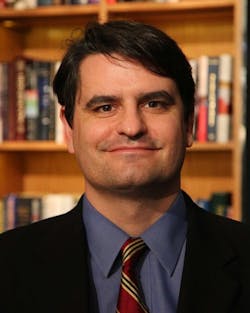About the author: Mark Miano is executive editor of NBC Learn. Miano can be reached at [email protected]. Thomas Torgersen is program officer for hydrologic sciences for the National Science Foundation. Torgersen can be reached at [email protected]. Kate Cline is managing editor of Water Quality Products. Cline can be reached at [email protected] or 847.391.1007.
NBC Learn and the National Science Foundation (NSF) recently collaborated to create an educational video series on water sustainability. WQP Managing Editor Kate Cline spoke with Mark Miano of NBC Learn and Thomas Torgersen of NSF about the series and why water sustainability is a critical issue in the U.S.
Kate Cline: What inspired the “Sustainability: Water” video series?
Mark Miano: Over the past four years, NBC Learn and NSF have co-produced more than 150 original stories—about 13 hours of reporting—aimed at middle school, high school and college-level students. Building on the success of our previous work, “Sustainability: Water” is our newest collaboration—an ambitious look at the issues affecting the supply of clean freshwater in the U.S.
Thomas Torgersen: Water is not something the vast majority of us think about very often, even though it is of utmost importance to life on the planet. Ensuring an adequate supply and quality of water in light of both human needs and increasing climate variability is one of the most urgent challenges facing the world today. [NSF] wanted to produce a series of water sustainability videos with NBC Learn to raise awareness about the very real challenges we face.
Cline: Briefly, what topics does the series cover?
Miano: “Sustainability: Water” comprises seven reports by Anne Thompson, the chief environmental affairs correspondent for NBC News. The stories not only explore the threats to freshwater supplies in the U.S., but also explain how the water cycle has a direct impact on these supplies. The series includes reports on the dwindling Sierra Nevada snowpack, the impact of bark beetles on water in the Rocky Mountains, nutrient loading in Lake Erie, the diminishing Ogallala Aquifer, polluted urban streams in Baltimore, and what it takes to get water to the city of Los Angeles. There is also an overview story explaining the water cycle itself.
Torgersen: The series highlights research projects funded by NSF to understand the complexity and issues of multiple basins and sites. Topics explain significant challenges to managing the water supply.
Cline: Why is water sustainability a concerning issue?
Miano: Water is the most precious natural resource on the planet. In the U.S., there are many serious challenges to the supply of freshwater. All of the challenges are complex, which is one reason why this series is so valuable. But the stories do more than just report on the challenges — they also chronicle the scientists who are in the field, studying the problems and collecting data. Their work will be invaluable to policymakers and local stakeholders.
Torgersen: Because water quality and quantity are so important to life on the planet, we wanted to educate people about its complexity, and in particular the complexity of the water cycle when man has altered, and continues to alter, its components. We thought it important to enhance people’s understanding of the interactions between the water system, climate variability, land use changes, agricultural impacts, etc.
Cline: What factors are affecting water sustainability?
Torgersen: The challenges facing the U.S. in terms of water sustainability are many and complex, ranging from rapid climate variability to infectious diseases, population growth, land use change, agricultural practices and other human activites. These are only a few of the significant challenges to providing people everywhere with a sufficient supply and quality of water.
Cline: What is being done to combat this issue?
Torgersen: There is no one, cure-all solution to sustaining America’s water supply, but NSF research indicates one important lesson: The vast majority of resilient solutions require the integration of good science, good engineering, nature’s original role and an understanding of the views and mandates of policy management and society.
Cline: What can people do at a personal level to improve water sustainability?
Torgersen: Awareness of the challenges is the first step to responsible civic action that advances national health. NSF would like citizens at all levels to watch these videos, invest themselves in the science and become educated about the issues facing this vital natural resource.
Download: Here
